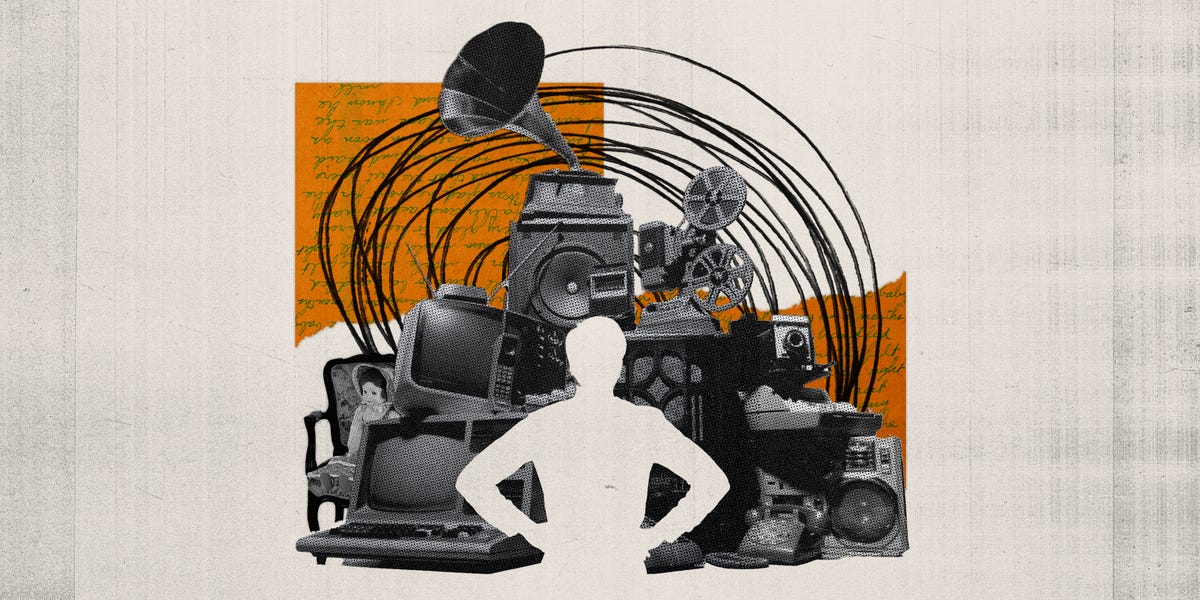Millennials are about to be crushed by all the junk their parents accumulated.
Every time Dale Sperling’s mother pops by for her weekly visit, she brings with her a possession she wants to pass on. To Sperling, the drop-offs make it feel as if her mom is “dumping her house into my house.” The most recent offload attempt was a collection of silver platters, which Sperling declined.
“Who has time to use silver? You have to actually polish it,” she told me. “I’m like, ‘Mom, I would really love to take it, but what am I going to do with it?’ So she’s dejected. She puts it back in her car.”
…
Sperling’s conundrum is familiar to many people with parents facing down their golden years: After they’ve acquired things for decades, eventually, those things have to go. As the saying goes, you can’t take it with you. Many millennials, Gen Xers, and Gen Zers are now facing the question of what to do with their parents’ and grandparents’ possessions as their loved ones downsize or die. Some boomers are even still managing the process with their parents. The process can be arduous, overwhelming, and painful. It’s tough to look your mom in the eye and tell her that you don’t want her prized wedding china or that giant brown hutch she keeps it in. For that matter, nobody else wants it, either.
Much has been made of the impending “great wealth transfer” as baby boomers and the Silent Generation pass on a combined $84.4 trillion in wealth to younger generations. Getting less attention is the “great stuff transfer,” where everybody has to decipher what to do with the older generations’ things.



Part of this seems like it’s attributable to changes in lifestyle and material conditions of younger people, relative to their parents. Different aesthetics might mean their parents’ stuff looks incredibly gaudy to them, and doesn’t go with anything else in their apartment. My parents’ home is larger than any place I can reasonably expect to be able to afford, so I also don’t want their big dining room table that I’d have to pay for storage on for years before I can afford a space that it will immediately fill all of. Even if it’s a nice piece of furniture, that’s just a pain in the neck to go through, all for something I might never get to use.
On the topic of collections, boomers just fundamentally ignore key parts of collectibility. First, old collectables only became so valuable precisely because people weren’t obsessively hording and caring for everything with the intent of selling it down the line. Old Superman comics are rare and valuable due to people who bought them at the time they first came out largely treating them as disposable. They didn’t assume they were anything special that merited being held on to and cared for, so they didn’t. When everyone and their dog buys up commemorative plate sets, or Beanie Babies, or whatever other collectable grift boomers fell for, and they take great care of them, they don’t generally see their value do anything but decrease. The supply doesn’t get significantly reduced, and everyone else can see that they didn’t pan out as the collectable investments they were billed as, so who would want them?
That said, even for collections of items of genuine worth, you mostly need to hope that whoever you’re looking to give it to is as into whatever hobby as you are. If I were planning on having kids, I think it would be pretty unreasonable to expect them to know what to do with my fountain pen collection, unless they were into them as well. Otherwise, it’s just a ton of fussy pens that seem to have a fair number of duplicates that are really only distinguished by knowledge I couldn’t expect them to take the time to go gathering. Then, it’s still a big pain to actually identify things, make sales listings and sell them off. Hell, I have the knowledge, and even I find it annoying to do so.
Maybe we could address this, in part, by normalizing expanding options a bit for inheritance. If my hypothetical kids aren’t going to know how to make heads or tails of my pen collection, but I’ve got a younger friend who is just as into the hobby as I am, it would be nice if I could just leave them that specific collection, without having to worry it’ll kick off some acrimonious squabbling. Failing that, have parents indicate who they trust to sell an item for a fair price if nobody wants it. You can take it and think about it, but if it’s just not for you, you’ve got a trusted source to sell it off for you, so you (hopefully) don’t have to go through an ordeal trying to find someone to sell it for you that will give you a fair shake.